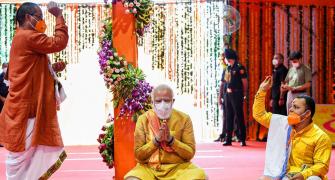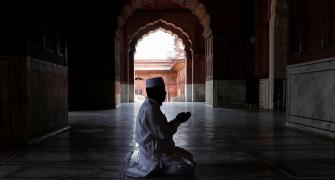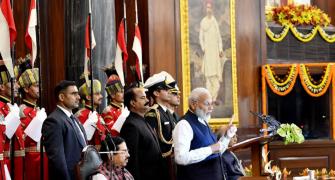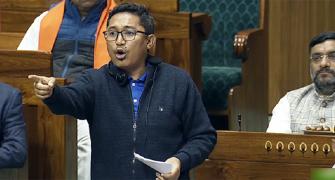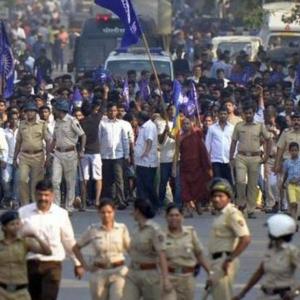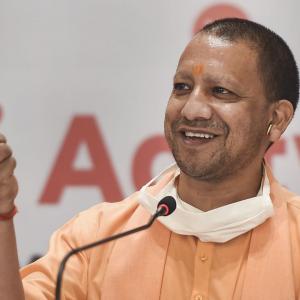Since 2014, India has left its moorings as a pluralist, modern, secular State because that is how the BJP wants it to be, notes Aakar Patel.

I had written a couple of weeks ago about how India's middle class has stopped growing in recent years.
The leading indicators of our economy -- the sales of residential properties, cars, two wheelers, consumer durables (fridges, washing machines, televisions) -- have been flat.
The borrowing by businesses of money from banks has been at less than a third of what it was a decade ago.
The government's periodic labour force survey released a few weeks ago showed that, for the first time, more people were employed in agriculture than in the previous period.
Meaning people had left their jobs in manufacturing or services, or they had been fired, and had gone to work on the farm.
Manufacturing jobs in the formal sector have reduced rather than increased in the last few years.
Perhaps in a parallel development, tens of thousands of dollar millionaire Indians, meaning those worth Rs 7 crore or more, have left India in the last four years.
I have examined the things above in my next book and have written about this in this column also.
The other interesting aspect of recent years is the introduction of new laws that have taken India in a particular direction.
The Gujarat high ccriticised some parts of a so -alled 'love jihad' law a few days ago.
But similar laws have been enacted in several states since 2014. The laws are aimed at making marriage difficult if not impossible between Hindus and Muslims by criminalising conversion, which is ostensibly a fundamental right of Indians.
The are the Uttarakhand Freedom of Religion Act, 2018, the Himachal Pradesh Freedom of Religion Act, 2019; the Uttar Pradesh Vidhi Viruddh Dharma Samparivartan Pratishedh Adhyadesh, 2020 (Prohibition of Unlawful Conversion of Religion Ordinance); the Madhya Pradesh Dharma Swatantreya Adhyadesh, 2020; and The Gujarat Freedom of Religion (Amendment) Act, 2021.
All the laws have come in Bharatiya Janata Party states, all of them have come in the last three years and none of them has been justified by any data.
Before this, the BJP states were passing laws against beef possession.
The laws were the Maharashtra Animal Preservation (Amendment) Act, 2015 (passed by the Devendra Phadnavis government); the Haryana Gauvansh Sanrakshan and Gausamvardhan Act, 2015; The Gujarat Animal Preservation (Amendment) Bill, 2017; and the Karnataka Prevention of Slaughter and Preservation of Cattle Ordinance, 2020.
In Gujarat, the punishment for cow slaughter is life imprisonment.
No other economic crime attracts this sentence, and Indian law says cow slaughter is not a religious crime but an economic one.
Once again, all these laws came after 2014 and in this instance began a spate of lynchings of Muslims that the world noticed.
Readers may have heard of the UAPA law under which Stan Swamy was jailed and died in custody.
The Unlawful Activities (Prevention) Amendment Act, 2019 allows the government to categorise any individual as a 'terrorist', on suspicion.
Such an individual need not have any affiliation with any terrorist organisation to be called a terrorist and jailed.
The amendment defines a 'terrorist act' as one which causes 'injuries to any person, damage to any property, an attempt to overawe any public functionary by means of criminal force and any act to compel the government or any person to do or abstain from doing any act etc'.
It also includes any act that is 'likely to threaten' or 'likely to strike terror in people', giving absolute power to the government to brand any citizen or activist a terrorist without these acts being actually committed.
The Gujarat Prohibition of Transfer of Immovable Property and Provision for Protection of Tenants from Eviction from Premises in Disturbed Areas Act, 2019 is a law that keeps Gujarati Muslims segregated and ghettoised.
People are required by law to reveal their religion while selling and purchasing property.
In areas that were declared 'disturbed' by the state, Hindus cannnot sell to Muslims and vice versa without government permission.
The amendment that was cleared in 2019 gave the collector authority to determine if the sale of a property would lead to 'improper clustering' of Muslims.
It also gave the government further power to review the decision of the collector, even if the buyer and seller made no appeal.
In effect, even foreigners can lease and buy property in those parts of Gujarat's cities where Indian Muslims cannot.
These laws are used by India quite freely, and there is no real restriction or curb on the government because misuse is not punished and there is no accountability even for deaths in custody.
I do not know how many readers are familiar with these laws, and if they are whether they are surprised by these changes that have come to India since 2014.
The curious thing for me as a writer is that there is no real debate on what these laws have done to India.
There is not even any comment on them in our newspapers.
This is similar to the facts and data on the economy.
These numbers quoted above are not disputed by the government or anyone who supports it.
They are merely not commented on and it is assumed to be fine that India's middle class has stopped growing.
Similarly, it is assumed to be fine that since 2014, India has left its moorings as a pluralist, modern, secular State because that is how the BJP wants it to be.
Aakar Patel is a columnist and writer and you can read Aakar's earlier columns here.
Feature Presentation: Aslam Hunani/Rediff.com

